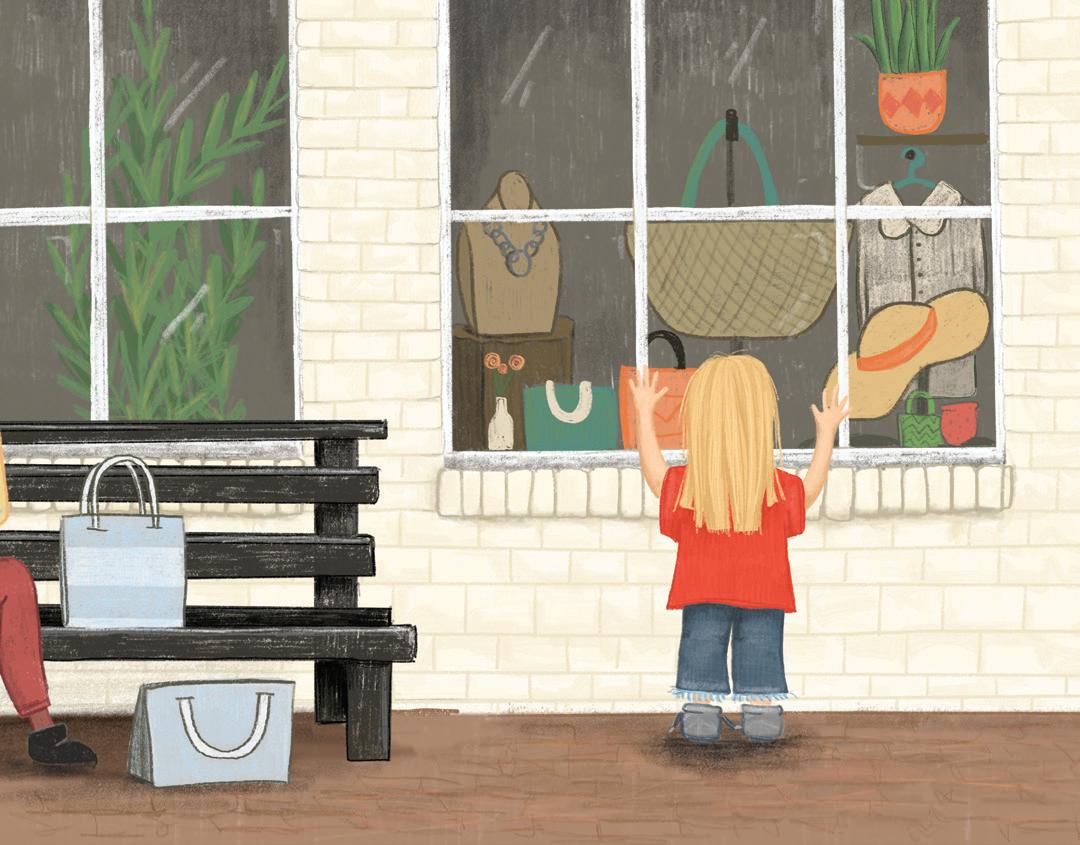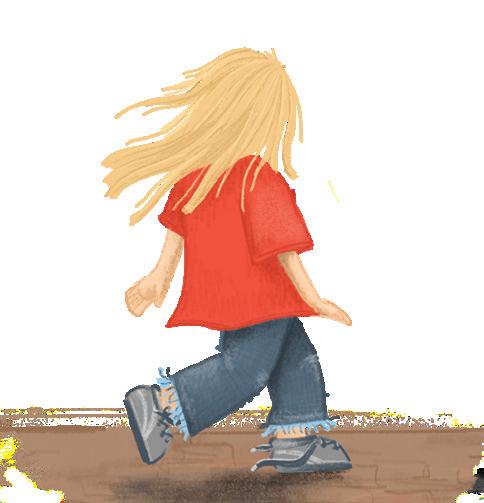
12 minute read
SUMMER READING
“Roaches Run,” Book Four of the Mo Katz series by John Wasowicz set in Old Town, will be published this spring by BrickHouse Books, Maryland’s oldest literary press. This abridged excerpt combines threads of text woven throughout the book concerning a young child, Katie Fortune.
Signed copies of “Roaches Run” can be pre-ordered through Made in ALX. The Mo Katz quartette of mystery novels (including “Daingerfield Island,” “Jones Point” and “Slaters Lane”) are also available at MadeinALX.com. Order yours today!
MO KATZ, U.S. Attorney for the Eastern District of Virginia leaned back in a chair in the postage stamp-sized backyard of his townhome on Harvard Street and listened to the sounds of Old Town awakening.
A delivery truck rumbled by tiny retail stores sandwiched together along the city’s main thoroughfare. A Metro train sped into the nearby King Street station. Around the corner, a city bus labored down Diagonal Drive toward Gardens Park.
As the COVID-19 pandemic receded, the sounds of the city had returned. Restaurants and retail businesses were springing back to life. People were still cautious and wary, but more pedestrians, joggers, and cyclists now filled the streets and sidewalks.
A slice of moon hung in a sky sprinkled with vanishing stars. With each passing second, the night’s illumination was erased by dawn’s light as the milky gray of morning emerged. Katz enjoyed the early morning and savored his coffee, brewed an hour ago: eight ounces of water and five scoops of Misha’s Arabian Mocha Java beans, coarsely ground.
The patio door slid open. His girlfriend, Abby Snowe, lithe and blonde, appeared in jeans, a long-sleeve cotton shirt, and rubber boots.
“Where are you going?” he asked.
“I told you last night about Maggie Moriarty’s relapse,” she said. “If that woman doesn’t straighten up, she’s going to lose her little girl, which would be tragic for both of them.” She stared at the steaming hot coffee. “Maybe Katie should be placed with Child Protective Services. I don’t know.” She looked up. “Anyway, I have to go. Maggie’s living in a tent village somewhere down in the Eisenhower Valley.”
Katz pictured shrubs and bushes along the shallow riverbed hiding a camp of homeless people. “It’s no place to raise a little girl,” he said.
SNOWE PARKED her car on the gravel shoulder of Eisenhower Avenue, climbed over the guardrail, and headed down to Cameron Run. In her rubber boots, she waded across shallow water that trickled down the channelized stream to the Potomac River. Ahead of her, buried in the bushes and newly budding trees, a brown and green camouflage tent came into view.
She donned her protective mask to guard against the spread of COVID-19. As she approached the tent, smoke wafted up into the sky and she smelled burning wood and leaves. Maggie sat by a campfire, dressed in soiled jeans, a tattered flannel shirt, and unlaced hiking books. In front of her, a pot of coffee balanced between two logs. She stared vacantly at the low-burning fire and poked the embers with a stick that she held in her shaky hand.
“How are you doing?” Snowe asked.
Maggie looked up. “What’s it to you?” Then, recognizing Snowe, she snarled. “Don’t you have better things to do than badger parents about their kids?”
Snowe ignored the hostile tone. “Mind if I sit?”
Moriarty removed the stick from the fire. The tip was burning. She twirled it around like a wand. “There’s plenty of room,” she said.
Snowe sat on a rock. “This camp lacks the physical infrastructure and emotional support systems that a child needs,” she began. “No sidewalk to ride a tricycle or place to color with crayons, no….”
Maggie poked the air with the stick. “Don’t talk to me about infrastructure and support systems. I don’t need any of your social welfare talk. Go back to where you came from and take all your textbooks with you.”
Snowe looked around. “By the way, where is Katie?” She got up and walked to the tent. Peeking inside, she saw Katie lying fully dressed on top of a grubby sleeping bag. Her long blonde hair was stringy and her clothes were wrinkled and dirty.
“You go away!” Maggie hollered from her post at the campfire. “You’re no good. You’re just going to cause trouble.”
KATIE FORTUNE raced down King Street like a spring breeze, stopping to stare in store windows, weaving in and out of the crowds, and dancing merrily along the brick sidewalk. Looking at her, no one would have thought she was lost, alone, vulnerable, and frightened. She looked like an average precocious four-year-old whose family was trailing behind her.

A patron stepped out of the Principle Gallery and watched as Katie skipped by, heading toward the river. A moment later, the girl ran up the opposite side of the road. The woman noticed that Katie’s golden hair was unwashed and matted, her complexion was waxen, and her clothes didn’t quite fit. The woman quickly pulled out her phone and dialed 911. “Perhaps it’s none of my business, but there’s a little girl running unattended in the 200 block of King Street,” she said.
The dispatcher asked for a description. It matched Katie’s. He asked for the woman’s location and the direction in which the little girl was headed. Then a message went out to the police that the little girl they were searching for had been found.
The closest officers were on the upper end of King Street near the Masonic Temple. They drove down to the river and began searching on foot. Streets, stoops, alleys, and stores were inspected to no avail.
Abby Snowe accompanied the police. At times, she seemed to lead the effort. She created an air of anticipation among the search team; it was only a matter of minutes before Katie would be found.
Then a report came about a blonde-haired waif at the intersection of Cameron and Washington Streets. And another Katie sighting three blocks further up Henry Street. A third report placed the little girl on Prince Street. Katie had become a whirling dervish.
AN EMPLOYEE at Meggrolls on Fayette Street spotted a bundle of clothes in the alley. Upon closer examination, there were legs and hands curled under the clothes. It was a little girl, probably around four years old. Beside her were scraps of food fished out of the dumpster. The employee alerted the owner, who rushed outside, picked up the little girl, and brought her inside the restaurant. The child placed a tiny arm over the woman’s shoulder, embraced the warm body, and uttered an exhausted breath.
“Call the Alexandria police,” the storeowner said. “This must be the girl they’re looking for.”
A policeman arrived in ten minutes. He was a father of four and he’d never stopped looking for Katie, even when others had called it a night. Once he got her safely to the station, he would be able to go home.
KATZ AND SNOWE returned to their townhouse a little after 10. Snowe went to the kitchen to get something to drink while Katz went upstairs to change. When he came back down, he found her hunched over her phone typing a response to an email.
“What’s going on?”
“They found Katie outside Meggrolls on Fayette Street. She’s in family care overnight.” She put down the phone. “Maggie’s nowhere to be found. The police went back to the camp, but it’s deserted. I’ve got a bad feeling, Mo. I’m afraid she might do something stupid.”
“There’s nothing to be done tonight.” Katz poured himself a glass of wine. He turned on the television in the kitchen.
Snowe walked to the back of the townhome and opened the French doors to the slate patio. “Mo,” she called. Piled against the wooden fence was a fleece jacket, a wool blanket, and a crumpled piece of paper. The jacket and blanket smelled of outdoor fires and body odors. The crumpled note was written in longhand, in large, oval letters composing short sentences. Snowe picked it up and took it inside. It read:
No one but me to blame.
If something happens, you and Mo raise my little girl. You’ll know what to do. I don’t have a clue.
Snowe found herself shivering. Katz put down his glass of wine and held her. “We should notify the police and see if they can redouble their efforts tomorrow.”
Katz called the commonwealth attorney and the sheriff. Snowe contacted Child Protective Services, the city attorney, and a local nonprofit that provided 24-hour service to the homeless. Then Snowe sat and reread the letter. Her eyes welled with tears.
“We have to go look for her tonight,” Snowe said. “I’ve got a bad feeling.”
They drove to the edge of Old Town near the location of the makeshift camp and parked on Duke Street below the Masonic Temple. They got out of the car and took opposite sides of the street checking bushes, front stoops, parking lots, dark corners, and deserted alleys. At Daingerfield Street, Katz crossed over to Snowe’s side and together they walked down the narrow brick sidewalk along Hooff’s Run to Jamieson Avenue and the cemetery.
A thick mist floated through the beams of their flashlights. A myriad of tiny winged creatures danced in the light as though auditioning for a fairy’s play. In the distance, the rectangles of house windows glowed yellow and white in the night. To their left was the Wilkes Street Cemetery complex and ahead of them the Grave of the Female Stranger.
“This way,” Snowe said, pointing her beam straight. They walked past gravestones dating back to colonial days. The moon cast shadows across the stones, some of which stood upright while others tilted to the side, finding their natural place in the soil, like trees. They spied the silhouette of a person slumped beside a gravestone. A hood covered the face and a blanket was wrapped around the body’s legs.
Snowe focused her light on the lump. The light was intense in the dark, as though it was coming from a spacecraft landing in the cemetery. A head appeared. Snowe recognized the face. “That’s the guy who was with her this morning,” she said.
Kneeling beside him, Snowe asked, “Where’s Maggie?”
The man shivered and pulled the blanket up to his chin. His breath formed clouds. “She might have gone to city,” he said, slurring his words. Then the man dozed off.
Snowe lowered the flashlight to her side. “I’ll check to see if there are any leads first thing in the morning.” They wended their way through the cemetery. Then they walked up Jamieson Avenue to Holland Lane and back to the car. It was 1 a.m. by the time they returned home.
Within a few hours, Katie would be placed with Snowe on a temporary basis.
SNOWE TUCKED a blanket around Katie. “I like it here, Miss Abby,” the little girl said, looking at her with trusting eyes.
Snowe hugged her and said, “No one is going to hurt you or leave you alone tonight.”
“I want to stay here,” Katie said. “Can you take care of me?” Again, she gave Abby that trusting look.
Snowe’s eyes welled with tears. The thought of becoming a mother to Katie overwhelmed her. “I don’t know, Katie,” she said. “I don’t think so, not permanently. We’ll see.”
After she put Katie to bed, Snowe went downstairs. The house was quiet. The only sounds were those that houses make when they think they’re unoccupied, when the soul of the structure sends out the music of the spirits that inhabit it.
Snowe sat in the living room, engulfed in darkness. If some voyeur saw her, he would have been reminded of the mysterious woman in the burgundy dress in Edward Hopper’s “Western Motel” painting.
Her mind wandered. She walked to the kitchen, found her phone, and called Katz.
“We have an angel in our home,” she said. “Child Protective Services asked if we could keep Katie until they locate her mom.”
“Wow,” Katz said.
“Wow is right,” she laughed. “A big wow! What do you think?”
“I think, yes, it’s wonderful. Maybe Maggie is going to need some help with her daughter, and maybe we can help her on an ongoing basis.”
A WOMAN darted across 29th Street between K and M. Cars were parked tightly along the curb, bumper to bumper. Crowds were thin along Georgetown’s streets. Lamplights shined down on nearly deserted sidewalks. Trees in open spaces bent their twisted limbs over the urban landscape.
The driver of the car bearing down on her barely had time to react. The driver slammed on the brakes, but that was after impact. The body had already hurtled through the air and landed by the curb, one arm extended onto the brick sidewalk.
The driver stopped, jumped out of her vehicle, and ran to the motionless body. She called 911 and waited for help. Within seconds, the sound of sirens filled the otherwise quiet night.
The accident occurred along a stretch of street that went over the C&O Canal. The spot was about 1,000 feet from where Tony Fortune was gunned down four years earlier.
BREAKING NEWS
The body of the woman hit by a car in Georgetown has been identified as Margaret Moriarty of Alexandria. She was pronounced dead at the scene. The incident has been ruled as accidental. No charges have been filed against the driver, whose name was not released by police. Alcohol is not believed to have been a contributing factor. Moriarty leaves behind one daughter. Her husband, Anthony Fortune, died four years ago a short distance from where the accident occurred. KATZ left his car in front of Stone’s townhome and walked home. The air was chilly. Streetlights stood sentry over the stillness of the night, spewing light over deserted sidewalks. He walked further up Prince Street than he needed, all the way to Daingerfield Road, where he made a right onto Diagonal and then another onto King before turning left on his street, Harvard.
He found Snowe asleep in bed with Katie nestled beside her. He grabbed a blanket, went downstairs, and settled on the living room sofa.
“Hey,” Snowe said a moment later. She sat on the side of the sofa.
“Hey.”
“Welcome home.” They kissed.
“I didn’t want to disturb you,” he said.
“I wasn’t really sleeping. Did you hear?” Her eyes were filled with tears.
“Yeah, it was on the news.”
“I’d like to seek custody,” she said. She clutched his hand.
“It’s what Maggie wanted,” Katz replied. “It’s in her note.”
“What do you want?”
“I want it too.”
STARS TWINKLED in a black sky. Somewhere a card game was still being played. Aces ran wild.
Pre-order John Adam Wasowicz’s new book “Roaches Run” through Made in ALX today!






